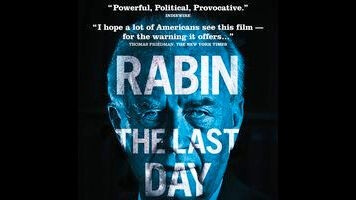Gitai sets the mundane tone right from the get-go, opening not with actual footage of the assassination (captured by amateur photographer Roni Kempler) but with former Israeli Prime Minister and President Shimon Peres being interviewed by a journalist—a dry, repetitive conversation that looks much more like cable-access TV than like cinema. Subsequent scenes alternate between archival material and low-key dramatization, with a heavy emphasis on the latter. Eschewing chronology, Gitai juxtaposes events from before and after November 4, 1995, though it’s easy to tell which are which: If someone is sitting at a table before three stern-looking men (Yitzhak Hizkiya, Pini Mittelman, and Michael Warshaviak), answering questions in a dull monotone, the assassination has already taken place. “Before” sequences, which have a little more oomph, depict various extremists arguing about why Rabin needs to die, as well as eventual killer Yigal Amir (Yogev Yefet) preparing his attack. Conspiracy theories are largely ignored.
To his credit, Gitai (whose previous films include Kadosh, Kippur, and the Natalie Portman-starring Free Zone) does make an effort to provide this sterile combination of memorial and tribunal with some visual flair. One early scene in which investigators question a witness begins with the actors in long shot, then has them gradually move toward the camera, in fits and starts, until they’re in extreme close-up; a bizarre interlude involving a psychiatrist (Dalia Shimko) declaring Rabin a schizoid personality glides back and forth between subjective and objective views of her as she circles the room full of zealots to whom she’s speaking. Gitai even cuts from the Kempler footage to his own imagining of Rabin’s trip to the hospital, creating the illusion that it’s continuous. But these flourishes make little impression in a film that’s mostly one long, turgid deposition, and The Last Day never makes a strong case for the need to re-examine, 20 years later, the lapses in security that allowed Amir to get next to Rabin in public with a loaded gun. Nor does it persuasively connect the nationalist hatred of Rabin and the Oslo Accords in some quarters to present-day strife—while there’s certainly an argument to be made along those lines, it isn’t made here. Mostly, this is a curious act of remembrance, using the public record as a belated, dispassionate eulogy.

